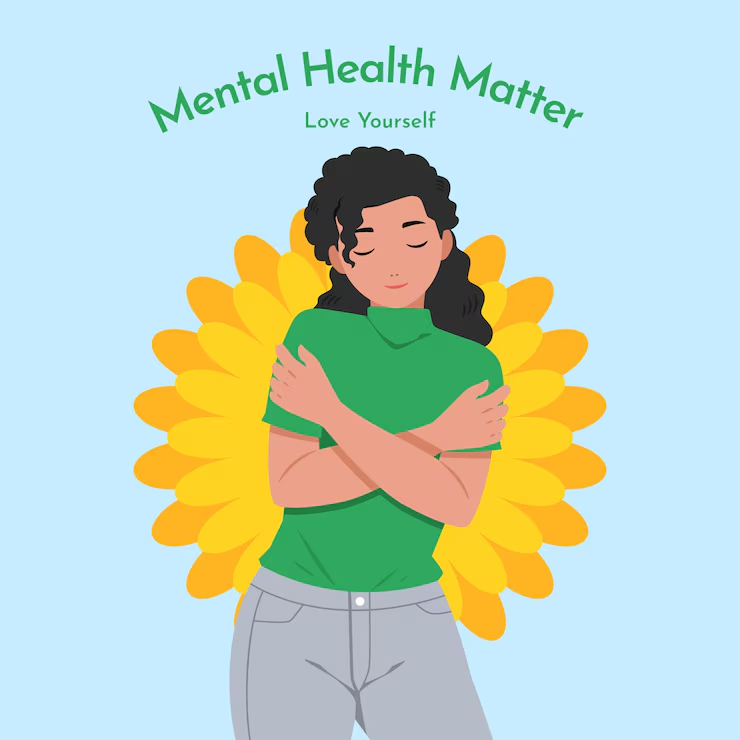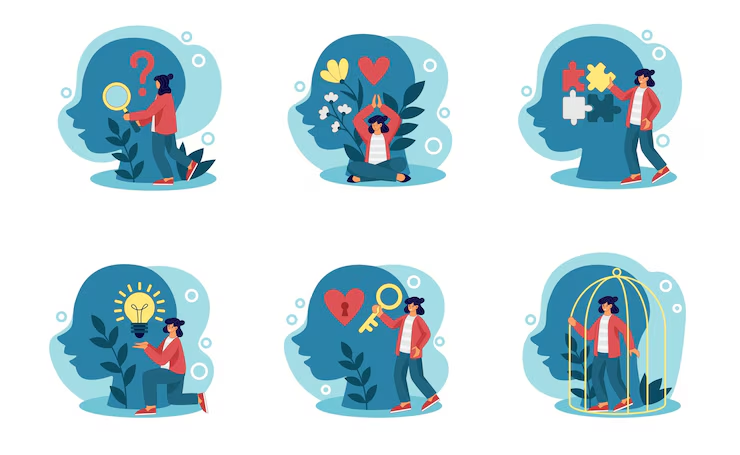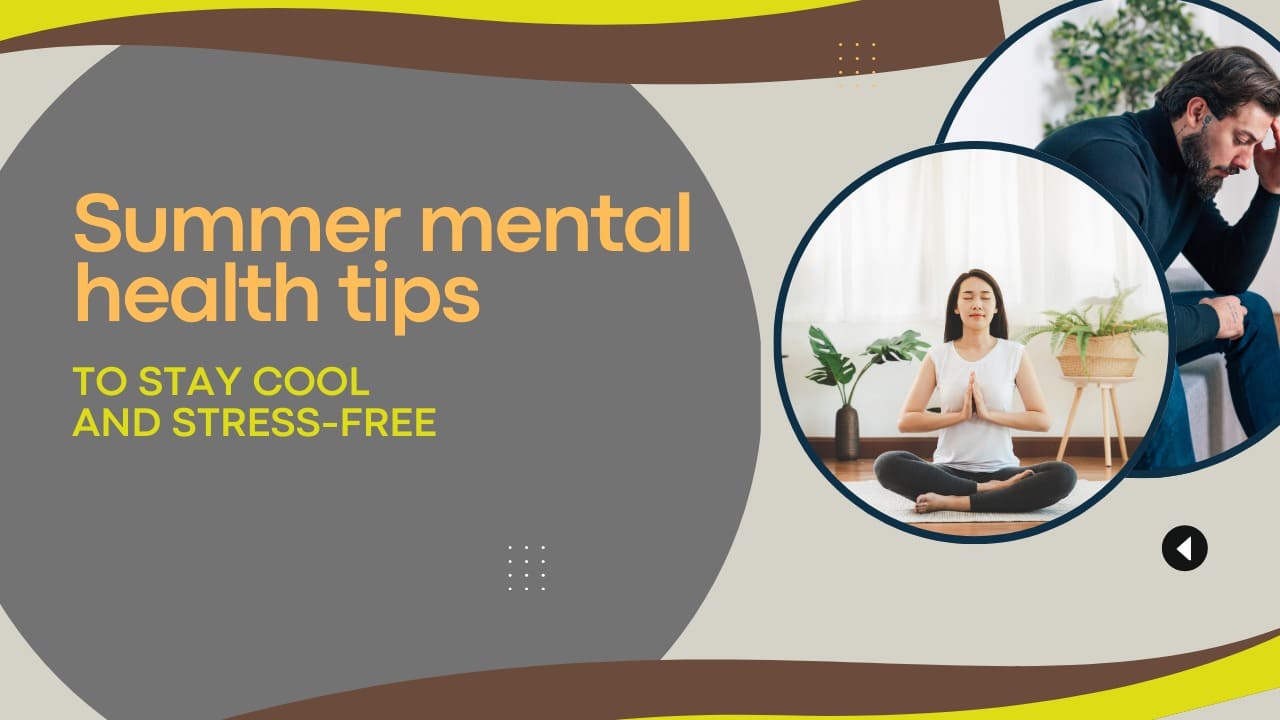Summer is known for bright skies and carefree moments, yet it’s important not to overlook how the season can affect our minds. With altered routines, travel stress, and pressure to be socially active, some people experience increased anxiety or even summer-onset seasonal affective disorder (SAD). Understanding the connection between seasonal shifts and emotions is essential to maintaining balance.
Longer daylight hours can disrupt sleep patterns, leading to restlessness or fatigue. Excessive heat can also contribute to irritability and mood swings. That’s why it’s crucial to incorporate simple summer mental health tips—like maintaining a consistent sleep schedule, limiting screen time before bed, and taking breaks in cool, quiet spaces—to stay grounded during the warmer months.
To support emotional well-being, prioritize hydration, mindful movement, and quiet reflection. Practice saying no to overwhelming plans, and create time for personal self-care. By doing so, summer can remain a season of wellness for both body and mind.

What is summer mental health ?
Summer mental health refers to the state of your emotional and psychological well-being during the warmer months. While many associate summer with joy and relaxation, not everyone feels uplifted during this time. Increased daylight, heatwaves, and changes in routine can disrupt sleep, affect mood, and even trigger anxiety or depression. One lesser-known condition, summer-onset seasonal affective disorder (SAD), highlights how mental health can be challenged in sunny seasons too.
Many people experience stress from social expectations like vacations, events, or family obligations, which can feel overwhelming. The pressure to constantly be active or happy may cause burnout or irritability. To manage this, it’s important to set boundaries, take quiet breaks, and not overcommit. Recognizing how summer affects your mental health is the first step to addressing it.
Using summer mental health tips such as staying hydrated, creating a relaxing bedtime routine, and spending time in shaded nature can support emotional balance and well-being.Summer mental health refers to the state of your emotional and psychological well-being during the summer months. Like seasonal affective disorder (SAD) in winter, there’s also a summer-onset SAD that affects mood due to increased heat, disrupted sleep, or overwhelming social obligations.
Why is it important ?
Understanding and prioritizing summer mental health is important because the season brings unique emotional challenges. While summer is often seen as a happy time, the increased heat, disrupted routines, and social pressure can negatively affect mood and energy. Ignoring these changes can lead to anxiety, irritability, or even depression, especially for those prone to summer-onset seasonal affective disorder (SAD).
Maintaining good mental health during summer ensures that you can fully enjoy the season without becoming overwhelmed. It also helps you stay emotionally balanced, productive, and connected to yourself and others. Recognizing early signs of stress or burnout can prevent long-term emotional strain and support overall well-being.
Incorporating simple summer mental health tips—like taking breaks from the sun, keeping a regular sleep schedule, practicing mindfulness, and staying hydrated—can make a big difference. These small habits can protect your emotional health and help you create a more peaceful and enjoyable summer experience.
Mental health in summer is crucial because seasonal shifts can create stressors that:
Disrupt sleep cycles
Affect mood due to extreme heat
Trigger social anxiety with the pressure to “have fun”
Cause body image issues due to clothing and exposure
Interrupt routines with travel or school holidays
Ignoring these can lead to burnout, fatigue, and even serious mental health conditions.
When Does It Occur ?
Issues often arise:
At the start of summer when routines shift
During heatwaves when rest becomes difficult
Around vacations or holidays, especially when social expectations mount
How Does Summer Affect Mental Health ?
Summer can affect mental health in both positive and negative ways. For some, the bright sunshine and longer days bring increased energy, better moods, and more opportunities for outdoor activities. However, not everyone experiences this seasonal uplift. Changes in daylight, temperature, and routines can disrupt emotional balance, especially for those sensitive to environmental shifts.
One major factor is heat. Excessive heat can lead to dehydration, poor sleep, and physical discomfort—all of which can contribute to irritability, fatigue, or anxiety. In extreme cases, it can worsen symptoms of mental health conditions like depression or bipolar disorder. This is why managing heat exposure is an essential part of summer mental health tips.
Disrupted routines are another trigger. School breaks, travel, and social gatherings can lead to irregular sleep patterns, poor diet, and overcommitment. These shifts often affect mental clarity and emotional stability. Learning to say no and maintaining a healthy routine can help.
Finally, the pressure to appear happy and active during summer can make people feel isolated or inadequate. Practicing self-care, journaling, or seeking quiet time are helpful summer mental health tips to stay emotionally grounded.
Several factors combine to influence your mental state:
Sunlight: Increased sunlight affects serotonin levels, which may improve or destabilize mood.
Heat: Excessive heat can make people irritable, anxious, or lethargic.
Disrupted sleep: Bright nights and hot temperatures can hinder good sleep, leading to mood swings.
Diet and activity changes: Unhealthy summer diets or sedentary behavior can impact energy and self-esteem.
Top Summer Mental Health Tips
Here are eight science-backed, practical, and powerful tips to maintain excellent mental health this summer.
Stay Hydrated: Water Is Mental Fuel
Staying hydrated is one of the simplest yet most effective ways to support your mental health during the summer. Dehydration doesn’t just affect the body—it also impacts the brain. When your body lacks water, you may experience headaches, fatigue, irritability, and difficulty concentrating, all of which can negatively affect your mood and mental clarity.
During hot summer days, your body loses more fluids through sweat, increasing the risk of dehydration. That’s why it’s important to drink water regularly, even before you feel thirsty. Carrying a water bottle, eating water-rich foods like fruits, and avoiding excessive caffeine or alcohol are key summer mental health tips that help you stay refreshed and alert.
Proper hydration supports better sleep, improves mood, and helps regulate stress levels. It’s a simple step that can have a big impact on your emotional well-being. When combined with other summer mental health tips like rest, self-care, and balance, drinking enough water becomes essential mental fuel.

Why it matters: Dehydration doesn’t just affect your body—it directly influences mood and cognition. Even mild dehydration can cause fatigue, anxiety, and difficulty concentrating.
Benefits:
Boosts brain function
Regulates mood and energy
Reduces irritability and confusion
Key Ingredients:
Water (aim for 8-10 glasses/day)
Hydrating foods (cucumbers, watermelon, oranges, lettuce)
Electrolyte drinks (in moderation)
How to practice:
Start your day with a glass of water
Carry a refillable water bottle
Infuse water with mint, lemon, or berries for flavor
Track your water intake with an app
Tracking your water intake with an app is a smart and easy way to stay on top of your hydration, especially during the summer months. Many people underestimate how much water they actually need, and by the time they feel thirsty, dehydration may already be setting in. Using a hydration app can help you build consistency and avoid the mental fatigue that comes with low fluid levels.
There are several free and user-friendly apps that send reminders, track daily water goals, and even adjust your intake needs based on weather and activity levels. These tools act as gentle nudges to ensure you’re fueling your body and brain properly throughout the day. Incorporating this strategy into your routine is one of the most practical summer mental health tips.
Staying hydrated supports focus, mood, and energy. By using an app, you make hydration easier and more mindful—helping to maintain emotional balance during long, hot summer days.
Maintain a Consistent Sleep Schedule
Why it matters: Long days can trick your internal clock. Sleep deprivation is one of the biggest contributors to poor mental health.
Benefits:
Supports emotional balance
Enhances memory and decision-making
Reduces anxiety and depressive symptoms
Key Ingredients:
Blackout curtains or sleep masks
White noise machines or fans
Herbal teas (chamomile, lavender)
How to practice:
Stick to a fixed bedtime and wake-up time—even on weekends
Avoid screens an hour before bed
Keep your room cool and dark
Avoid caffeine after 3 PM
Practice Mindful Movement
Practicing mindful movement is a powerful way to support your mental health during the summer. Unlike intense workouts, mindful movement focuses on connecting your body and mind through gentle physical activity, such as yoga, walking, or stretching. These practices help release tension, boost mood, and reduce stress—especially when done outdoors in nature.
Summer provides the perfect opportunity to move mindfully. A quiet early-morning walk, sunset stretching session, or yoga in the park can offer both physical and emotional benefits. The key is to move with intention—pay attention to your breath, posture, and surroundings. This connection helps calm the mind and increase self-awareness.
Incorporating mindful movement into your daily routine is one of the most effective summer mental health tips. It not only improves flexibility and circulation but also encourages a grounded, peaceful mindset. Even just 10–15 minutes a day can lead to lasting improvements in both mood and mental clarity.
Why it matters: Movement stimulates endorphins, serotonin, and dopamine—the “feel-good” brain chemicals.
Benefits:
Enhances mood and reduces stress
Improves sleep quality
Increases energy and self-esteem
Key Ingredients:
Light outdoor activities (yoga, walking, swimming)
Early morning or evening exercise to avoid the heat
Comfortable clothing and proper hydration
How to practice:
Aim for 30 minutes of movement daily
Try walking meditations or beach yoga
Use nature as your gym—parks, trails, or the beach
Limit Screen Time and Social Media
Limiting screen time and social media is essential for protecting your mental health during the summer. While staying connected is important, excessive scrolling can lead to feelings of anxiety, comparison, and information overload. This is especially true during summer, when social feeds are often filled with vacation photos and “perfect” lifestyles that may create unrealistic expectations.
Too much screen time can also interfere with sleep patterns and reduce time spent on real-life experiences that nurture your well-being. Instead of starting and ending your day with a screen, try incorporating offline activities like journaling, reading, or outdoor walks. These small shifts can make a big impact on your emotional state.
One of the most effective summer mental health tips is to set daily screen limits or schedule social media breaks. By creating boundaries with technology, you give your mind space to relax, recharge, and fully enjoy the present moment throughout the summer season.

Why it matters: Social media can amplify feelings of inadequacy, especially during summer when everyone posts their “perfect vacation.”
Benefits:
Reduces comparison and FOMO (fear of missing out)
Improves focus and real-world interaction
Supports self-esteem
Key Ingredients:
Screen time trackers or app blockers
Scheduled digital detox days
Physical books, hobbies, or journaling tools
How to practice:
Set app limits on Instagram, TikTok, etc.
Replace screen time with real-life experiences
Use summer to reconnect with offline hobbies like drawing or reading
Eat Mood-Boosting Foods
Eating mood-boosting foods is a powerful way to support your mental well-being during the summer months. What you eat directly impacts how you feel, and a nutrient-rich diet can help stabilize mood, improve energy, and reduce stress. In summer, it’s easier to access fresh, seasonal fruits and vegetables that naturally support brain health.
Foods rich in omega-3 fatty acids, such as walnuts, chia seeds, and fatty fish, help reduce inflammation and support cognitive function. Leafy greens, berries, avocados, and fermented foods like yogurt or kefir are also great for gut health, which is closely linked to mental health. Choosing whole foods over processed snacks is one of the most effective summer mental health tips you can follow.
Try to incorporate these nutritious choices into daily meals or snacks. Whether it’s a smoothie bowl, a colorful salad, or a handful of nuts, every bite can contribute to a happier, more balanced mood throughout the summer.

Why it matters: Your gut is often called the “second brain.” What you eat impacts how you feel mentally and emotionally.
Benefits:
Balances mood and reduces inflammation
Supports brain function
Maintains stable energy levels
Key Ingredients:
Omega-3s (salmon, chia seeds, walnuts)
Antioxidants (berries, leafy greens)
Probiotics (yogurt, kefir, kimchi)
How to practice:
Eat light, fresh, whole foods
Minimize processed sugars and heavy meals
Include smoothies with banana, spinach, and blueberries
Practice Grounding and Nature Therapy
Practicing grounding and nature therapy is a simple yet powerful way to improve your mental health during summer. Grounding involves connecting physically with the earth—like walking barefoot on grass or sand—which can help reduce anxiety, lower stress, and bring a sense of calm. Nature therapy, or spending time outdoors, enhances mood and promotes relaxation through exposure to natural light and fresh air.
Summer offers the perfect opportunity to step outside and engage your senses. Whether it’s a quiet walk in the park, gardening, or sitting under a tree, being present in nature helps shift your focus away from stress and toward mindfulness. These calming moments restore emotional balance and mental clarity.
Among the most natural summer mental health tips, grounding and nature therapy are accessible, free, and effective. Just 15–30 minutes a day in a green space can boost your mood, regulate your nervous system, and create a deeper sense of peace.
Why it matters: Spending time in nature resets your nervous system and reduces cortisol (the stress hormone).
Benefits:
Enhances mindfulness
Reduces anxiety and depression
Improves creative thinking and emotional resilience
Key Ingredients:
Barefoot walking in grass or sand (grounding)
Forest bathing or quiet park time
Nature journaling or photography
How to practice:
Take daily 15-30 minute nature walks
Sit under a tree and breathe deeply
Observe, sketch, or write about what you see, hear, and smell
Set Healthy Summer Boundaries
Setting healthy summer boundaries is essential for maintaining emotional balance during the busy and often overwhelming summer months. With longer days, increased social events, and travel plans, it’s easy to overextend yourself. Without clear boundaries, this constant activity can lead to burnout, anxiety, and irritability.
Learning to say no to activities that don’t align with your needs or energy levels is one of the most valuable summer mental health tips. Whether it’s declining an invitation or setting limits on work hours while on vacation, honoring your personal space allows you to rest, recharge, and stay emotionally grounded. Boundaries help create time for self-care and meaningful connections.
Communicate your needs clearly with family and friends, and prioritize downtime just as much as social time. Setting healthy summer boundaries isn’t about missing out—it’s about protecting your peace and well-being so you can truly enjoy the season with balance and clarity.

Why it matters: Summer social life can get overwhelming. Learning to say “no” protects your mental space.
Benefits:
Prevents burnout
Promotes self-awareness and confidence
Preserves emotional energy
Key Ingredients:
Clear communication
Calendars and scheduling tools
Affirmations and self-reflection
How to practice:
Plan your summer weeks in advance
Prioritize what brings YOU joy
Say “yes” only to things that align with your mental well-being
Create a “Mental Wellness Kit”
Creating a “Mental Wellness Kit” is a thoughtful and proactive way to support your emotional well-being during summer. Just like a first-aid kit for physical health, a mental wellness kit contains tools and items that help you manage stress, boost mood, and stay grounded during challenging moments. It can be customized to your personal needs and preferences.
Include items like a journal, calming teas, essential oils, a favorite book, soothing music, or grounding objects like stones or stress balls. You might also add affirmations, guided meditation links, or a list of uplifting contacts. These small comforts act as gentle reminders to slow down and prioritize self-care—especially important during the busier summer months.
As part of effective summer mental health tips, having a wellness kit nearby can help you respond mindfully to emotional ups and downs. Whether you’re at home or traveling, it offers a sense of stability, comfort, and emotional support wherever you are.
Why it matters: Having go-to tools when stress hits can stop spiraling before it begins.
Benefits:
Provides comfort in tough moments
Encourages consistent self-care
Strengthens resilience
Key Ingredients:
Journal or mood tracker
Essential oils (peppermint for energy, lavender for calm)
Fidget tools, books, playlists, or inspirational quotes
How to practice:
Design a small box or bag with calming essentials
Keep it in your room, car, or bag
Use it during travel, at the beach, or before stressful events
Conclusion

Summer doesn’t have to feel stressful or exhausting. With the right approach and practical summer mental health tips, this season can be one of renewal, calm, and joy. Acknowledging your emotional needs is just as important as protecting your skin from the sun or staying hydrated in the heat.
Just as your body thrives on water and rest, your mind needs downtime, clear boundaries, and meaningful moments. Whether you’re relaxing at home or exploring a new destination, making space for mental wellness each day helps you stay centered and emotionally strong. Little habits like mindful movement, nature breaks, or setting limits on screen time can make a big difference.
Sunshine can uplift your mood, but your mental well-being is what truly keeps you glowing. By prioritizing self-care and integrating thoughtful summer mental health tips, you can embrace the season with clarity, balance, and a deeper connection to yourself.
FAQs
Q1. Why is mental health important during summer ?
Mental health is just as important in summer as in any other season. While longer days and warm weather can be uplifting, they can also lead to disrupted routines, sleep issues, and social burnout. Following simple summer mental health tips like setting boundaries and staying hydrated can help you maintain emotional balance.
Q2. Can summer cause anxiety or depression ?
Yes, some people experience summer-onset seasonal affective disorder (SAD), which can trigger anxiety, restlessness, or depression. Using summer mental health tips such as practicing grounding, mindful movement, and limiting screen time can ease symptoms and promote emotional well-being.
Q3. How can I stay mentally balanced during a busy vacation ?
To stay balanced while traveling, plan rest time into your schedule, stay hydrated, and avoid overcommitting. These summer mental health tips ensure you enjoy your trip without feeling overwhelmed or exhausted.
Q4. What are some quick daily habits to boost mental health in summer ?
Quick habits like morning walks, journaling, or 10 minutes of deep breathing can make a big difference. These easy summer mental health tips can keep you grounded and emotionally refreshed throughout the day.
Q5. How can I help my children with their mental health in summer ?
Create structure, encourage outdoor play, and limit screen time. Teaching them these healthy routines from a young age reinforces the importance of summer mental health tips for lifelong emotional wellness.



